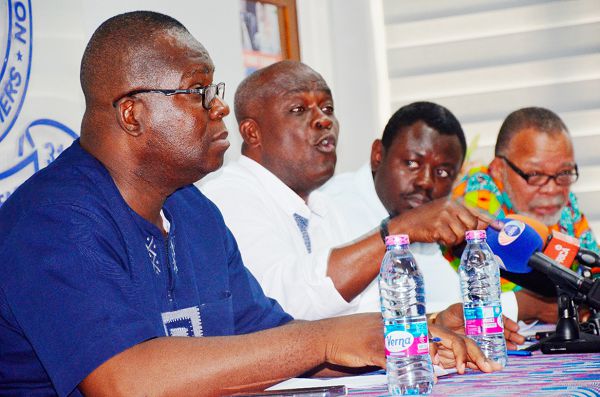
Teacher unions raise red flag, over govt plans to privatise public education
Teacher unions have served notice they will resist any attempt by the government to privatise, commercialise and commodify public education in the country.
They said the decision by the government to cede 100 endowed public schools to private individuals and groups to run a pilot project to be funded through a loan and a grant under a partnership dubbed: “Ghana Partnerships Schools (GPS)”, was untenable.
Addressing a press conference in Accra yesterday, a spokesperson for the teacher unions, Mr David Ofori Acheampong, who is also the General Secretary of the Ghana National Association of Teachers (GNAT), rather urged the government to supply adequate resources and release the capitation grant on time for the effective management of schools.
In attendance were the President of the National Association of Graduate Teachers (NAGRAT), Mr Eric Angel Carbonu; the President of the Coalition of Concerned Teachers – Ghana (CCT-GH), Mr King Ali Awudu, and the National Chairman of the Teachers and Educational Workers Union (TEWU), Mr Peter K. Lumor.
Ministry’s reaction
But a source close to the Ministry of Education, reacting to the concerns by the teacher unions, expressed surprise at the position taken by the unions.
It said the ministry was still engaged in consultations with relevant stakeholders and that no concrete decision had been taken yet and, therefore, described the concerns of the teacher unions as premature.
The source said the ministry would be holding a consultative conference involving all stakeholders such as the teacher unions next month.
Major features
The GPS, which is scheduled to take off in September this year, will be operated in the Ashanti, Northern, Central and the Greater Accra regions.
One hundred schools will be selected and those schools should have kindergartens, primary and junior high schools (JHS) and an enrolment of at least 300 students.
The schools selected should also not have any immediate need for infrastructure development or rehabilitation.
The funding will be sourced from the International Development Association (IDA) of the World Bank and the Global Partnership for Education (GPE) as loans and grants, respectively.
The IDA, part of the World Bank’s affiliates, helps the world’s poorest countries , while the GPE is a multi-stakeholder partnership and funding platform that supports developing countries to ensure that every child receives quality basic education.
Powers of the GPS
Mr Acheampong said per the 2019 budget statement, the government had secured funding to support the private operators, instead of the public schools.
“An aspect of this policy empowers the private operator to decide to work or not with Ghana Education Service (GES) staff.
“Under the project, the transfer of GES staff from the selected schools will not attract transfer grants and school heads will not be maintained automatically by the private operator; the operators have the liberty to invite people from within or outside the GES to manage the schools.
“This is against the spirit and letter of our collective agreements with the GES and the Labour Act, 2003 (Act 651),” he told journalists.
He reminded the government of the preamble to the collective agreements, which enjoined the parties not to be anti-union or anti-management but rather recognise and agree to promote trust, respect and fairness and endeavour to uphold those virtues in their policies and standards.
Implementation plans
The project, according to him, was purported to run for three years, after which it might be institutionalised permanently.
“We wish to note that the Ministry of Education (MoE)/GES is collaborating with ARK, an international consortium, to implement this project,” he said.
Mr Acheampong said the MoE and the consultants held a three-day workshop recently with the intention to finalise the draft report for the implementation of the project.
He said in all those discussions, major stakeholders such as GNAT, NAGRAT, TEWU and the CCT-GH had not been involved in the two-year planning process of the project, describing that as “unfortunate and unacceptable”.
“The unions find the GPS project a subtle and eventual privatisation, commercialisation and commodification of public education in Ghana, with the approval of the government.
Marshal forces
“We are amazed that the government would be trumpeting the implementation of free secondary education policy, only to turn round to institute education for the highest bidder policy at the basic level, and we hereby protest vehemently against it and call for its abolition.
We are going to marshal all our forces to resist its implementation,” Mr Acheampong stated.
No official communication
Answering questions, he said the unions were yet to receive any official communication in respect of the proposed project.
However, he said “we have been able to chance on some documents concerning what they did, but at least, reading through the 2019 budget statement, something was captured that gave us the hint that this policy will be implemented”.
Contributing, Mr Carbonu said the decision was an attempt to take over public schools and put them in the hands of private individuals, saying that it was a threat to the livelihood of not only basic school teachers but also those in senior high schools.
“We are not going to cede any ground on this matter because today it is Akua, tomorrow it will be Kofi. That is where we are coming from and we are hereby resolved that we will not allow that,” he said.
For his part, Mr Awudu said if the government was concerned about quality education, such a pilot project should have been taken to the rural areas, where quality education was a real challenge.
Contributing, Mr Lumor called on Ghanaians to rise up against the implementation of the GPS, adding: “What the government is doing is not only an attack on unions in education; it is also an attack on workers of this country.”
